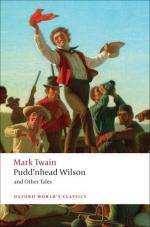’Quick! Cast your eye on the man going out at the door. Take in every detail of him.’
‘Why?’
‘Do you know who he is?’
’Yes. He spent several days here before you came. He is an old, retired, and very rich silk manufacturer from Lyons, they say, and I guess he is alone in the world, for he always looks sad and dreamy, and doesn’t talk with anybody. His name is Theophile Magnan.’
I supposed that Smith would now proceed to justify the large interest which he had shown in Monsieur Magnan, but, instead, he dropped into a brown study, and was apparently lost to me and to the rest of the world during some minutes. Now and then he passed his fingers through his flossy white hair, to assist his thinking, and meantime he allowed his breakfast to go on cooling. At last he said:
‘No, it’s gone; I can’t call it back.’
‘Can’t call what back?’
’It’s one of Hans Andersen’s beautiful little stories. But it’s gone fro me. Part of it is like this: A child has a caged bird, which it loves but thoughtlessly neglects. The bird pours out its song unheard and unheeded; but, in time, hunger and thirst assail the creature, and its song grows plaintive and feeble and finally ceases—the bird dies. The child comes, and is smitten to the heart with remorse: then, with bitter tears and lamentations, it calls its mates, and they bury the bird with elaborate pomp and the tenderest grief, without knowing, poor things, that it isn’t children only who starve poets to death and then spend enough on their funerals and monuments to have kept them alive and made them easy and comfortable. Now—’
But here we were interrupted. About ten that evening I ran across Smith, and he asked me up to his parlour to help him smoke and drink hot Scotch. It was a cosy place, with its comfortable chairs, its cheerful lamps, and its friendly open fire of seasoned olive-wood. To make everything perfect, there was a muffled booming of the surf outside. After the second Scotch and much lazy and contented chat, Smith said:
’Now we are properly primed—I to tell a curious history and you to listen to it. It has been a secret for many years—a secret between me and three others; but I am going to break the seal now. Are you comfortable?’
‘Perfectly. Go on.’
Here follows what he told me:
’A long time ago I was a young artist—a very young artist, in fact—and I wandered about the country parts of France, sketching here and sketching there, and was presently joined by a couple of darling young Frenchmen who were at the same kind of thing that I was doing. We were as happy as we were poor, or as poor as we were happy—phrase it to suit yourself. Claude Frere and Carl Boulanger—these are the names of those boys; dear, dear fellows, and the sunniest spirits that ever laughed at poverty and had a noble good time in all weathers.




